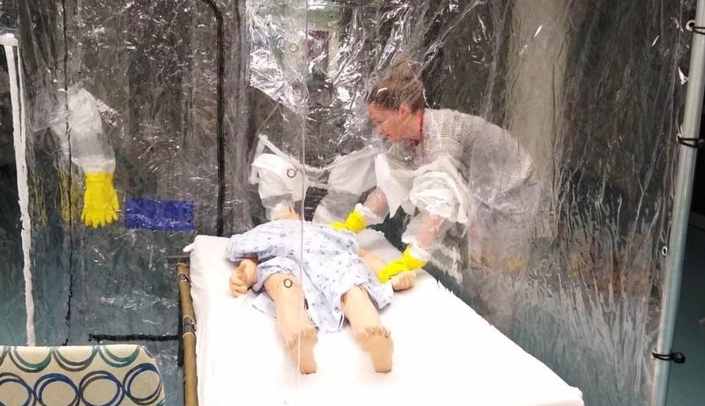UNMC, in partnership with Nebraska Medicine, was awarded a $9.5 million grant from the Centers for Disease Control and Prevention (CDC) to enhance infection prevention and control (IPC) initiatives in small and rural healthcare facilities and advance the ability of health care workers to provide safe and effective clinical care. To address rural healthcare facility needs and IPC, UNMC’s Global Center for Health Security will partner with the following organizations:
- National Emerging Special Pathogen Training and Education Center (NETEC)
- NYC Health + Hospitals
- Emory Healthcare
- Nebraska Infection Control Assessment and Promotion (ICAP)
- Region VII Disaster Health Response Ecosystem (RDHRE)
Three innovations are being proposed for this project: the Isolation System for Treatment and Agile Response for high risk infections (ISTARI) Care Cube 2.0, the Mixed Reality for Consultation, Assessment, and Education, and the NICS Innovation Test Bed Network.
The ISTARI Care Cube 2.0 is an advanced, independent, modular, and field-adapted version of ISTARI Care Cube—it is intended to enable safe infection prevention and control practices and provide highly effective patient care in the field in a manner that is highly scalable. ISTARI is a negative pressure envelope that is easily portable and can be assembled in minutes. It features an integrated, HEPA-equivalent air filtration and ventilation system; flexible, transparent walls for patient interactions and procedures; airlock pass-through chambers; and compatibility with routine hospital equipment and facilities. By discovering and implementing the paradigm shift of wrapping the PPE around the patient (rather than health care worker), the ISTARI unit is able to drastically conserve the burn rate of PPE. In turn, there is less risk to the health care worker and less risk of nosocomial transmission overall. ISTARI 2.0 increases the national capacity for IPC during the COVID-19 pandemic as well as providing for future public health emergencies.
Many health care settings endure gaps and challenges to IPC programs, and UNMC/NM are intending to resolve these issues with mixed reality for consultation, assessment, and education. Mixed reality (MR) is an environment where physical reality and digital content are combined to enable interaction with real world and virtual objects—blending real world and digital settings. It is a fusion of technologies that will be used to assist rural and acute facility infection preventionists (IP) with training, assessment, and mentoring. By designing a virtual hospital with various infection prevention and control (IPC) scenarios, local IPs can use the virtual reality environment to frequently train additional staff more through engaging technology while maintaining and updating their own skills with more comprehensive hands-on IPC challenges. IPs can also engage with virtual subject matter experts using an artificial intelligence "chatline" to find immediate, authoritative answers to pressing issues or, alternatively, complete holistic self-assessments for their facility. These assessments can lead to various resource referrals including a virtual consultation/mentoring session where local IPs can engage with a remote infection control expert using 360 cameras and enhanced glasses to identify and rectify various IPC concerns for their facility.
The GCHS will establish a NICS test bed network to ensure the generation, transfer, and translation of IPC innovations for varied clinical environments in frontline and critical access facilities. GCHS’s outreach includes more than 32,500 health care workers and 109 facilities of varying size, both domestically and internationally. The test bed network will serve as testing and evaluation site for innovative methods and technologies related to topics such as IPC, patient and community centered outcomes, supply chain management, and emergency operations in special pathogen health emergencies. The grant team will establish the test bed network, train evaluation teams, and develop reliable and consistent procedures for conducting research. The initial focus will center around the other two innovations of the grant but can later be used for future innovations.
By the end of this project period, this program will have identified gaps as well as opportunities to optimize IPC in small, rural health care facilities; increased the ability of small, rural facilities to implement mitigation strategies; and accelerate the development of novel approaches to advance isolation care. When health care systems are able to proactively mitigate infectious disease threats, the health and safety of the community is improved and lives are saved.
